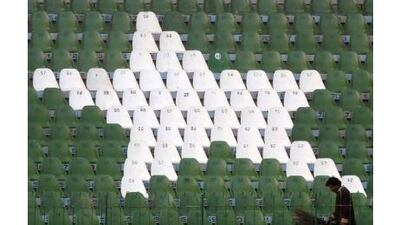Should Lahore's Gaddafi Stadium be renamed, now that Muammar Qaddafi, the Libyan leader for whom its name was originally changed in 1974, is no more?
There is a movement in Pakistan - if a few enraged opinion pieces, some fervent chain emails and blog and Twitter hyper-rage constitutes a movement - that believes it should.
In all probability they are right and eventually it might well be renamed.
But let us not pretend that there isn't a legitimate contrary stance to be adopted.
Gaddafi Stadium long ago ceased to be associated with a North African dictator.
Instead, it became its own being, having created its own context, its own history and story in which Qaddafi held no meaning; indeed the difference between Gaddafi and Qaddafi is more than just one consonant.
For locals it became simply a landmark whose name - and implications - is not as important or even relevant as its simple existence.
For cricket it eventually became a grand venue with a quirky name, its magnificent, Mughal-influenced red sandstone architecture (after the renovation for the 1996 World Cup) making it one of the game's unique stadiums.
It is also the headquarters of Pakistan cricket, now housing a thousand cricket stories of heroism and triumph, tragedy and disaster, shame, corruption and betrayal. It stands as a house to history.
And history is something the region and Pakistan in particular has, at best, neglected and at worst, maimed, distorted or whitewashed.
Names of roads, monuments, parks, airports can and do change regularly, mostly with the political winds of the day and they lose meaning and substance each time it happens.
Once you change Gaddafi Stadium now, who is to say it won't stop?
One government might name it after one hero, the next after another: where will it end?
Naming the stadium in his honour, as Pakistan's then prime minister Zulfiqar Ali Bhutto did, was not and is not an insult to the Libyans Qaddafi presided over.
It has nothing to do with them: it is, or should be seen as, capturing a moment in time in Pakistan's history, whatever the moment was, good or bad. That period need not be erased or tampered with.
Why change it now anyway? Why not in the mid-1980s when Qaddafi was a global pariah and his name was at its least attractive?
Where was this call for change a few years back, when he was being welcomed back in to folds of the accepted? Was he a better dictator then?
The feeling that changing the name may result in something intrinsic about the stadium being lost does not go away so easily.
But in the event that it does, who should it be named after?
Imran Khan, Pakistan's greatest cricketer, is an obvious choice, though his current political career has taken away some aura. Many other cricketers will simply not be able to hold the weight of history the stadium brings with.
To this mind, the most fitting option would be Abdul Hafeez Kardar.
As Pakistan's first official Test captain, Kardar was a key figure in early success, and was actually much more as an ambassador, a father figure, a visionary, a ruthless dictator and a fine cricketer.
The most compelling argument in his favour is that without him the stadium might not be what it is today.
Kardar was appointed the head of the Board of Control for Cricket in Pakistan (BCCP) - as the board was then known - in April 1972 by Bhutto, whom he was close to.
Control of Lahore Stadium, as that was known back then, was also given to the BCCP and it was Kardar who decided to set up the board's offices there.
Before then, the board had been for years a homeless entity, existing out of a trunk and then an office in Karachi's National Stadium.
At first the Lahore office had only a sofa set - with one leg missing - and a trunk containing some cricket kit and missing much more.
Kardar roped in Zafar Altaf, a civil servant and former first-class cricketer, and the pair began to build a cricketing HQ from scratch.
A well-rounded man, Kardar's network extended to well beyond cricket and so useful friends in useful places pulled through. Furniture came from an industrialist friend.
A local carpet company provided curtains and carpeting. Khwaja Zaheer, an architect, agreed to design the rooms free of charge.
Bhutto had given the pair a week to set up a basic workplace but when the work was fully finished, a few months later, the office boasted a well-decorated long room and three other rooms, for the president (Kardar), the honorary secretary (Altaf) and an assistant secretary.
The crowning glory was the board meeting room complete with an enclosure looking out over the ground.
Over the next five years Kardar would build and lead the BCCP as few thereafter, making it an important player on the world stage.
Ultimately his leadership paved the way for the board's prominence and leadership through the 1980s.
If the stadium's name is eventually changed, it should not be the result purely of a knee-jerk reaction to what has happened in Libya recently, momentous as that is. History is owed more than that.
If the name is to be changed, it should come as a considered gesture, ideally as a result of a popular public poll.
In that case, Kardar is owed as much as history itself.
osamidduin@thenational.ae
Follow
The National Sport
on
& Osman Samiuddin on

